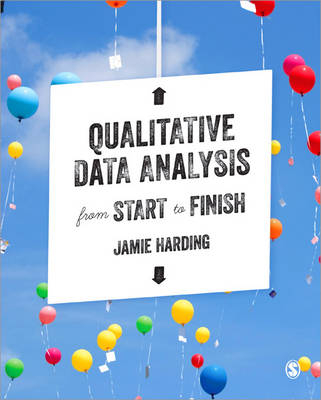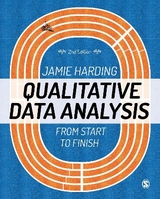
Qualitative Data Analysis from Start to Finish
SAGE Publications Ltd (Verlag)
978-0-85702-139-7 (ISBN)
- Titel erscheint in neuer Auflage
- Artikel merken
Are you new to qualitative research? Are you planning to do interviews or focus groups and wondering what on earth you′ll do with the data once it′s collected? Do you have a pile of transcripts staring at you right now and are you lost as to how to identify themes, code your data and work out what it all means?
Fear not, help is here! In this brilliant new book, Jamie Harding breaks down the process of analysing qualitative data into simple, retraceable steps. After providing some top tips for designing your research and collecting your data, he takes you through the different stages of analysis, from the first reading of your transcripts, to presenting your findings in a report or dissertation. For each stage of the process there are demonstrations using real data and exercises for you to perform yourself. He unpicks what happens behind the scenes in qualitative data analysis - the bit that′s hard to learn without seeing it happen and trying it for yourself. While acknowledging that there are many different forms that qualitative data analysis can take, the book provides a series of ideas and examples that you will find invaluable when analysing your own data.
This book is perfect for all social science students who are struggling with data analysis and are looking for someone to guide the way.
Jamie Harding received his PhD from the Department of Sociology and Social Policy at the University of Newcastle upon Tyne. He has been employed at Northumbria University since 1995, first as a lecturer in Housing Studies and more recently as a Senior Lecturer in Research Methods in the Department of Social Sciences. Before moving into higher education he worked for a number of social housing organisations. Jamie’s main area of interest is qualitative and quantitative research methods, which he teaches at undergraduate, postgraduate and doctoral level. He also lectures on criminal justice – an area where he has edited a textbook – and homelessness, a subject on which he has written two monographs. He is programme leader for the Police Constable Degree Apprenticeship, which is run in partnership with Northumbria Police. Jamie is married with two adult children and two grandchildren. He enjoys running and was delighted to win the highly prestigious Claremont Road Runners summer club handicap race in 2021.
Introduction
Structure of the Book
The Interviews and the Focus Group
Introduction to Data Analysis
Validity
Definitions
Beginning the Study
Introduction
Qualitative and Quantitative Research
Mixed Methods
Critical Research
Induction and Deduction
Research Designs
Sampling
Negotiating Access
Maximising Response
Forms of Collection Data
Ethical Issues
Summary
Further Reading
Collecting and Managing Interview and Focus Group Data
Introduction
Distinctive Features of Qualitative Interviews
Types of Qualitative Interview
Modes of Data Collection
Qualities of the Qualitative Interviewer
Planning the Interview and the Interview Guide
Unplanned Probes
Planning a Focus Group
Moderating a Focus Group
Piloting for Interviews and Focus Groups
Recording and Transcription of INterview and Focus Group Data
Summary
Further Reading
First Stages of Analyzing Interview Data - Making Summaries and Making Comparisons
Introduction
Summarising Interviews
Summarising Interviews: Examples
Summarising Interviews: Exercise
The Constant Comparative Method
Reaching Findings Using the Constant Comparative Method
Summary
Further Reading
Using Codes to Analyse an Illustrative Issue
Step 1: Identifying Initial Categories Based on Reading the Transcripts
Step 2: Writing Codes Alongside the Transcripts
Step 3: Reviewing the List of Codes, Revising the List of Categories and Deciding Which Codes Should Appear in Which Category
Complete List of Codes Used in Relation to Reflective Practice
Step 4: Looking for Themes and Findings in Each Category
Summary
Further Reading
Identifying Conceptual Themes and Building Theory
Characteristics of Conceptual Themes
Two Helpful Tools for Identifying Conceptual Themes
Analysing a Conceptual Theme Step by Step
Summary
Further Reading
Alternative Approaches to Analyzing Qualitative Data
Introduction
Deductive Coding and Analysis
Narrative Analysis
Computer Assisted Qualitative Data Analysis (CAQDAS)
Summary
Further Reading
Analyzing Focus Group Data
Introduction
Individual Data Analysis
Group Data Analysis
Avoiding Reaching Findings that Lack Validity
Group Interaction Data Analysis
Combining Analysis of the ′How′ and the ′What′
Summary
Further Reading
Writing about Research (1) - Methodology and Findings
Introduction
Checking Validity
Reflexivity
The Methodology Section
Writing About Qualitative Findings
Summary
Further Reading
Writing about Research (2)- Making Links to the Literature
Introduction
The Literature Review
The Role of the Conclusion
An Example - Writing the Literature Search and Conclusion in Relation to Student Employment
Summmary
Further Reading
| Erscheint lt. Verlag | 18.2.2013 |
|---|---|
| Verlagsort | London |
| Sprache | englisch |
| Maße | 186 x 232 mm |
| Gewicht | 450 g |
| ISBN-10 | 0-85702-139-7 / 0857021397 |
| ISBN-13 | 978-0-85702-139-7 / 9780857021397 |
| Zustand | Neuware |
| Informationen gemäß Produktsicherheitsverordnung (GPSR) | |
| Haben Sie eine Frage zum Produkt? |
